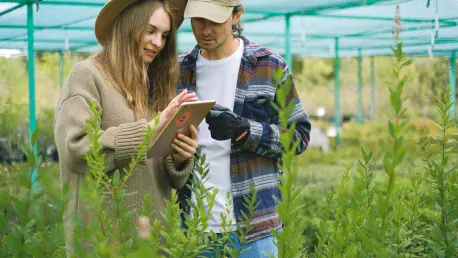The University of Nebraska–Lincoln (UNL) is spearheading an innovative project designed to advance and secure Agricultural Internet of Things (Ag-IoT) technology, addressing a critical need in modern farming. This initiative, led by computer scientist Nirnimesh Ghose and supported by a substantial $582,987 grant from the National Science Foundation’s Secure and Trustworthy Cyberspace program and EPSCoR, aims to mitigate the security vulnerabilities plaguing the rapidly expanding Ag-IoT landscape. Collaborating with Mehmet Can Vuran and Yufeng Ge from UNL, Ghose’s team will focus on developing robust solutions to ensure smart, scalable, and secure wireless operations across agricultural settings. The project’s importance is underscored by the increasing reliance on Ag-IoT to enhance farming efficiency, profitability, and sustainability through precision farming practices. However, current security measures for these technologies are often inadequate, exposing data and devices to potential breaches. Securing these technologies becomes imperative to prevent malicious activities such as data injections that can lead to severe consequences, like flooding or crop damage, as highlighted by Ghose.
The Importance of Securing Ag-IoT Technology
Agricultural Internet of Things, or Ag-IoT, technology has become a cornerstone for modern agriculture, providing farmers with tools to boost efficiency, profitability, environmental sustainability, and yield assurance through innovative precision farming practices. Despite these substantial benefits, current security measures employed in Ag-IoT devices and systems often remain insufficient, leaving critical data and technologically advanced farming equipment vulnerable to various breaches. Computer scientist Nirnimesh Ghose emphasizes that the security of these technologies is not just a technical requirement but a means of safeguarding the integrity and sustainability of agricultural practices. The potential threats include malicious data injections, which could disrupt operations and result in damaging outcomes, like flooding or crop destruction.
The leap towards securing Ag-IoT technology necessitates a fine balance between ensuring seamless functionality and incorporating robust security protocols. Ghose and his team’s project aims to pioneer novel techniques that fuse these critical aspects to develop smart, scalable, and secure wireless operations tailored to agricultural environments. By leveraging a grant from the National Science Foundation’s Secure and Trustworthy Cyberspace program and EPSCoR, this initiative represents a concerted effort to bolster the resilience of Ag-IoT systems against unprecedented security challenges. The significance of this endeavor extends beyond academic research, marking a pivotal stride towards safeguarding agricultural data, optimizing farming operations, and ensuring the stability of the food supply chain amidst growing reliance on connected technologies.
Innovative Authentication and Verification Techniques
Central to UNL’s pioneering project is the development of a groundbreaking technique for identity authentication and message integrity verification, known as Soil-Assisted Things Trust Verification for Ag-IoT. This method aims to authenticate devices at farm sites using a location-based, zero-interaction protocol, effectively addressing interference issues that may arise during simultaneous transmissions. The approach utilizes unique soil signal profiles, which provide a novel means of swift verification for incoming messages while ensuring wireless nodes’ authentication without the need for manual intervention. This technique’s ingenuity lies in leveraging natural environmental properties to enhance the security and reliability of Ag-IoT systems, thereby minimizing potential breaches.
The research team will put these innovative security measures to the test at Vuran’s wireless testbed site located at UNL’s Eastern Nebraska Research, Extension, and Education Center. Vuran’s earlier work, which focused on enhancing wireless connectivity in rural areas, lays a strong foundation for this project as the team aims to build secure and advanced technological solutions. According to Vuran, addressing the digital security challenges within agriculture requires a comprehensive approach and specialized expertise, both of which are abundantly available within UNL’s School of Computing. This project’s success could revolutionize the way Ag-IoT security is perceived and implemented, setting new benchmarks for technology integration within agriculture while ensuring critical data remains protected from increasingly sophisticated cyber threats.
Broader Implications and Economic Importance
The University of Nebraska–Lincoln (UNL) is leading an innovative and crucial project to enhance and secure Agricultural Internet of Things (Ag-IoT) technology, which is essential in modern farming. Computer scientist Nirnimesh Ghose is heading this initiative, which is supported by a significant $582,987 grant from the National Science Foundation’s Secure and Trustworthy Cyberspace program and EPSCoR. Collaborating with Mehmet Can Vuran and Yufeng Ge, Ghose’s team aims to develop strong solutions for smart, scalable, and secure wireless operations in agricultural environments. This project addresses the critical challenges posed by the increasing reliance on Ag-IoT for boosting farming efficiency, profitability, and sustainability through precision farming practices. However, existing security measures for Ag-IoT are often insufficient, leaving data and devices vulnerable to potential breaches. Ensuring these technologies are secure is essential to prevent malicious activities, such as data injections, which can cause serious issues like flooding or crop damage, as emphasized by Ghose.









